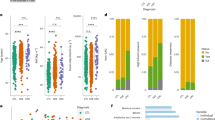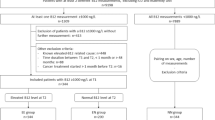Abstract
This is the first prospective study of urinary measures of the two major competing pathways of oestrogen metabolism, 16alpha-hydroxyoestrone (16alpha-OHE1) and 2-hydroxyoestrone (2-OHE1), in relation to incident breast cancer risk. Experimental and case-control study results suggest that metabolism favouring the more oestrogenic 16alpha-OHE1 pathway may be linked to higher breast cancer risk. Women aged 35 and older from Guernsey (n = 5104) were surveyed in 1977-85 and have been continuously monitored for breast cancer and mortality up to the present (Guernsey III, Imperial Cancer Research Fund). Incident cases of breast cancer were matched to three control subjects for comparison of urinary oestrogen metabolite levels measured by enzyme immunoassay (EIA) in spot urine samples collected at baseline and stored frozen for up to 19 years. Consistent with case-control study results, post-menopausal (but not premenopausal) women at baseline who went on to develop breast cancer showed about a 15% lower 2:16alpha-OHE1 ratio than matched control subjects. Further, subjects with metabolite ratios in the highest tertile of 2:16alpha-OHE1 had about a 30% lower risk than women with ratios in the lowest two-thirds, although results were not statistically significant (OR = 0.71, 95% CI = 0.29-1.75). It is of potential importance that, in contrast to most risk factors for breast cancer, such as late age at first birth, oestrogen metabolism appears to be modifiable via diet and exercise, offering women the possibility of lowering breast cancer risk through non-pharmacological measures, although this remains to be tested.
This is a preview of subscription content, access via your institution
Access options
Subscribe to this journal
Receive 24 print issues and online access
$259.00 per year
only $10.79 per issue
Buy this article
- Purchase on Springer Link
- Instant access to full article PDF
Prices may be subject to local taxes which are calculated during checkout
Similar content being viewed by others
Author information
Authors and Affiliations
Rights and permissions
About this article
Cite this article
Meilahn, E., De Stavola, B., Allen, D. et al. Do urinary oestrogen metabolites predict breast cancer? Guernsey III cohort follow-up. Br J Cancer 78, 1250–1255 (1998). https://doi.org/10.1038/bjc.1998.663
Issue Date:
DOI: https://doi.org/10.1038/bjc.1998.663
This article is cited by
-
Associations of established breast cancer risk factors with urinary estrogens in postmenopausal women
Cancer Causes & Control (2022)
-
Markers of Local and Systemic Estrogen Metabolism in Endometriosis
Reproductive Sciences (2021)
-
The ratio of the estradiol metabolites 2-hydroxyestrone (2-OHE1) and 16α-hydroxyestrone (16-OHE1) may predict breast cancer risk in postmenopausal but not in premenopausal women: two case–control studies
Archives of Gynecology and Obstetrics (2015)
-
The effect of oral 3,3′-diindolylmethane supplementation on the 2:16α-OHE ratio in BRCA1 mutation carriers
Familial Cancer (2015)
-
Endogenous sex steroids in premenopausal women and risk of breast cancer: the ORDET cohort
Breast Cancer Research (2013)



